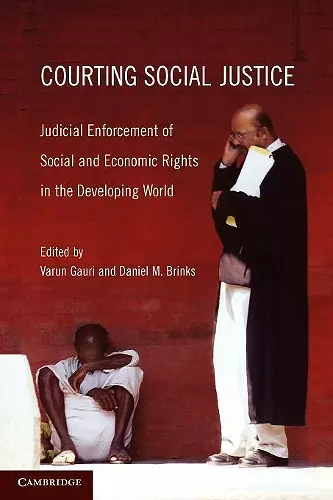Courting Social Justice
Judicial Enforcement of Social and Economic Rights in the Developing World
Daniel M Brinks editor Varun Gauri editor
Format:Paperback
Publisher:Cambridge University Press
Published:15th Mar '10
Currently unavailable, and unfortunately no date known when it will be back
This paperback is available in another edition too:
- Hardback£53.00(9780521873765)

This book is a first-of-its-kind, five-country empirical study of the causes and consequences of social and economic rights litigation.
This book is a five-country empirical study of the causes and consequences of social and economic rights litigation.This book is a five-country empirical study of the causes and consequences of social and economic rights litigation. Detailed studies of Brazil, India, Indonesia, Nigeria, and South Africa present systematic and nuanced accounts of court activity on social and economic rights in each country. The book develops new methodologies for analyzing the sources of and variation in social and economic rights litigation, explains why actors are now turning to the courts to enforce social and economic rights, measures the aggregate impact of litigation in each country, and assesses the relevance of the empirical findings for legal theory. This book argues that courts can advance social and economic rights under the right conditions precisely because they are never fully independent of political pressures.
'Human rights are meaningless if they cannot be claimed. The formal court system is playing an increasingly important role in enforcing human rights claims in many countries, frequently with life-saving impacts, as part of the overarching institutional architecture and social mobilization for human rights accountability. Gauri and Brinks have produced a timely, distinctive and important comparative empirical analysis of prerequisites for effective legal claims to socio-economic rights, and their social policy implications. I have no doubt that this book will appeal to a wide readership of public policy makers, economists, social scientists and lawyers, transcending stale theoretical dichotomies between rights of different kinds and showing vividly what a cross-disciplinary field human rights has become.' Louise Arbour, UN Commissioner for Human Rights
'Judicial enforcement of social and economic rights has generated much theoretical controversy but little empirical work. Gauri and Brinks have taken a giant step forward with this methodologically innovative volume. The chapters fit together seamlessly, and provide a host of comparative and theoretical insights into the causes and consequences of judicial intervention in social and economic rights. The result is a major contribution to the literatures on rights, judicial power and social change, and the role of law in development.' Tom Ginsburg, University of Chicago Law School
'The book offers a comparative analysis of five countries, South Africa, Brazil, India, Nigeria and Indonesia. Each case is rich in empirical data, as well as relevant social and political factors … This book is written to be accessible to both the serious empirical scholar of law and justice, as well as anyone interested in social justice and the protection of rights for disadvantaged populations. The ideas presented offer academics, scholars, and activists alike, the possibility of applying theoretical and empirical analysis to their own practices to further social justice … Overall, this book successfully merges theoretical analysis regarding the courts as policy makers and their ability to protect rights with empirical data through the case studies.' Jamila Smith-Loud, University of Maryland
ISBN: 9780521145169
Dimensions: 229mm x 152mm x 20mm
Weight: 510g
384 pages